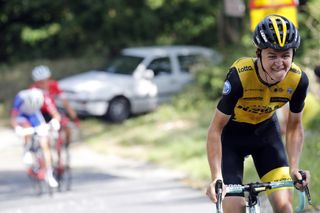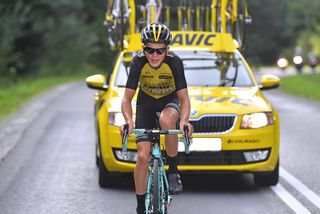Tolhoek makes Giro d'Italia debut having nearly lost his sight
Dutch climber heads for Bologna after recovering from career-threatening eye infection




For the majority of riders at the 2019 Giro d'Italia, it's only when this year's race is over that they'll evaluate their performances in terms of success or failure. But for Antwan Tolhoek (Jumbo-Visma), merely rolling down the start ramp of stage 1's Grande Partenza time trial in Bologna will feel like something of a triumph.
LottoNL-Jumbo announce Antwan Tolhoek signing
Lobato, Tolhoek and Eenkhoorn sent home from LottoNL-Jumbo training camp
LottoNl-Jumbo to decide on dismissal of Lobato, Tolhoek and Eenkhoorn over sleep aid
Eenkhoorn and Tolhoek train with LottoNL-Jumbo despite suspension
10 riders to watch at the 2019 Giro d'Italia
Aimlessness or opportunity? Analysing Team Ineos' Giro d'Italia line-up
It's been a rollercoaster 12 months for the Dutch climbing domestique, set to be one of Primoz Roglic's key support men in the Dolomites and Alps. Originally slated for the 2018 Giro, an untimely bout of tendonitis meant he had to drop out of the Jumbo line-up last May and, after completely restructuring his season, target the Tour de France instead.
That turned out well enough, to the point that Tolhoek was one of the Dutch team's best mountain workers for Roglic and Steven Kruijswijk. But after placing 10th at the Clásica San Sebastian last August and taking second place at the Japan Cup in October, the 25-year-old suffered a dramatic setback when his winter break was wrecked by a bizarre eye infection that hit him for the first time as he was sitting on a long-haul flight from Shanghai to Amsterdam.
"I took out my contact lenses to sleep on the plane and it hurt, and at first I thought, 'OK, maybe it was something from some water I used to wash them, so that's why they are inflamed,'" Tolhoek tells Cyclingnews ahead of the start of the 2019 Giro.
"But I finally lost sight in both eyes because they swelled up so badly. I was alone, on a long-haul plane, so it was a scary time."
Seen by a doctor in Amsterdam as soon as the plane touched down, the initial diagnosis was encouraging.
"He thought it was a normal eye infection and would get solved with a little bit of cream, but I didn't feel comfortable with that," Tolhoek says. "So I said straight away that I wanted to see a specialist, because, you know, it's your eyes, and when your eyes are so swollen, you can't see anything."
Get The Leadout Newsletter
The latest race content, interviews, features, reviews and expert buying guides, direct to your inbox!
It was, eventually, touch and go, Tolhoek recounts, that he did not at least partially lose his eyesight.
"If I had waited a few more hours, then my sight would have been permanently affected, so seeing the specialist was the right thing to do. We could start off directly with the antibiotics, which was what was needed."

Cycling was, at that point, forgotten.
"After a few days, one eye was back to 80 per cent full vision, the other was still at 30 or 40 per cent. The eye specialist said I would maybe only be able to see with a certain percentage in the future," he explains. "But at that moment, you're not thinking about your career. You're thinking about more than that."
There was, he says, no specific name for the infection. Rather, it was something that he perhaps picked up either from rubbing his eyes after washing them in some kind of contaminated water or through his contact lenses. He doesn't know any other cyclist who's had the same infection.
"It's not genetic; anybody can get it. It is normal that you maybe sometimes get some kind of weak bacteria in your eyes from water. But this was really big," he says.
After two months of medication, battling for his eyesight and barely touching the bike, Tolhoek says bluntly: "You can imagine how fucked up my winter was."
But, having recovered, a bigger perspective was not hard to find.
"Now, I'm happy in training and racing, and I don't need to worry about losing my sight anymore," he says. "This season has been a little bit up and down so far, but that's normal. Something like this is hard for the head, but I don't think anybody suffering any kind of illness prays for it to happen to them. It just happens. What's important is not how you got that illness, but to work out how to get rid of it."
It's a fair bet to say that part of this process of putting the past behind him will happen at the Giro d'Italia – particularly as last year Tolhoek was down to ride the Italian Grand Tour, but then had to pull out almost at the last minute.
"I had an inflammation of a tendon – an injury that had come up previously, gone away, then I started training again and it came back," he recounts. "My position on the bike wasn't quite right, which is something that can happen in the off-season when you change bikes, saddles and so on, so I flew to a bike fitter we have in Bilbao."
The problem was resolved with some work on his position, but, by then, with so much training missed, Tolhoek's Giro plans had gone up in smoke.

Whilst Tolhoek briefly had to go into what he calls "back to basics" mode, the cards finally began to fall his way. Some quality training he'd had before the Giro d'Italia was still able to help him quickly regain good form, with fourth place in a tough stage at the Tour of California showing he was on the right track.
"It was still complicated to re-set everything, and I only knew that I was definitely going to the Tour four weeks before," he says, with a strong Critérium du Dauphiné, placing 11th overall, surely helping reassure him that things were continuing to go in the right direction.
Even more of a morale boost was his first week at the Tour, where he could regularly be seen driving the pace on the front of the bunch.
"If a guy like me was able to ride on the front of the peloton for our sprinter, as I did, then it showed I was in really good shape. And if you don't do a lot of things badly, and get the good form, then you can hold it," says Tolhoek.
Ten months on, he's finally heading for the Giro.
"It'll be a voyage of discovery," he says. "I know that what I'm best at is climbing, but whether it's the five-to-10-minute climbs or one-hour long ones, we still don't know."
On another personal level, he'll get to "complete the set", as he sees it, of Grand Tours, having done the Vuelta in 2017 and the Tour last year.
But apart from ticking some big personal boxes and ending some unfinished sporting business, Tolhoek says that this May will be about helping Primoz Roglic get his best result in the mountains.
"I've already ridden with him at the Tour, and I think he has faith in his riders, including me, and that's one of the most important things. You need that trust."
Recently riding together as a unit at a pre-Giro training camp in Spain's Sierra Nevada mountains was also very important, helping the squad to bond yet further.
After the Giro, Tolhoek will do the Tour de Suisse, and then take a break – "although I'll do the Tour if they want me to, no problem," he adds. And after such a rollercoaster off-season, you'd imagine Tolhoek knows the value of grabbing every opportunity he can, when he can – starting in Bologna this Saturday.
Alasdair Fotheringham has been reporting on cycling since 1991. He has covered every Tour de France since 1992 bar one, as well as numerous other bike races of all shapes and sizes, ranging from the Olympic Games in 2008 to the now sadly defunct Subida a Urkiola hill climb in Spain. As well as working for Cyclingnews, he has also written for The Independent, The Guardian, ProCycling, The Express and Reuters.